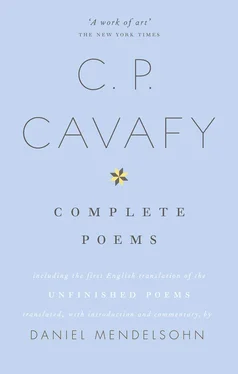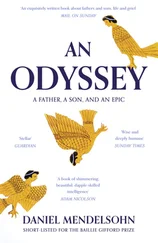we were put in mind of Plato’s Charmides.
[ 1916 ; 1917]
Here I’m not the Cleon who’s renowned
in Alexandria (where they aren’t easily impressed)
for my fabulous houses, for my gardens,
for my horses and for my chariots,
for the diamonds and the silks I wore.
Far from it: here I’m not that Cleon.
May those twenty-eight years be erased.
I am Ignatius, a Lector, who very late
came to my senses. But still I lived ten blessed months
in the serenity and security of Christ.
[ 1916 ; 1917]
With difficulty I read upon this ancient stone
“O Lo[r]d Jesus Christ.” I can just discern a “So[u]l.”
“In the mon[th] of Hathor” “Leuciu[s] went to his re[s]t.”
Where they record his age “The span of years he li[ve]d”
the Kappa Zeta is proof that he went to his rest a youth.
Amidst the erosion I see “Hi[m] … Alexandrian.”
Then there are three lines radically cut short;
but some words I can make out— like “our t[e]ars,” “the pain,”
“tears” again further down, and “grief for [u]s, his [f]riends.”
In love, it seems to me, Leucius was greatly blessed.
In the month of Hathor Leucius went to his rest.
[ 1917 ; 1917]
For Ammon, Who Died at 29 Years of Age, in 610
Raphael, they want you to compose
some verses as an epitaph for the poet Ammon.
Something very artistic and polished. You’ll be able,
you’re the perfect choice, to write what’s suitable
for the poet Ammon, one of our own.
Certainly you’ll talk about his poetry—
but do say something, too, about his beauty,
about the delicate beauty that we loved.
Your Greek is always beautiful and musical.
But now we want all of your craftsmanship.
Into a foreign tongue our pain and love are passing.
Pour your Egyptian feeling into a foreign tongue.
Raphael, your verses should be written
so that they have, you know, something of our lives within them,
so that the rhythm and every phrasing makes it clear
that an Alexandrian is writing of an Alexandrian.
[ 1915 ; 1917]
Aemilian Son of Monaës, an Alexandrian, 628 – 655 A.D.
From my speech, and looks, and from my mien
I shall make an excellent panoply;
and so I’ll stand before those wicked men
without fear, without debility.
They will want to harm me. But none of those
who come close to me will ever see
where my vulnerable places are, my wounds,
beneath the falsehoods that will cover me.—
Boastful words of Aemilian son of Monaës.
I wonder if he ever made that suit of armor?
In any event, he didn’t wear it much:
At twenty-seven, in Sicily, he died.
[ 1898? ; 1918]
Whenever They Are Aroused
Try to keep watch over them, poet,
for all that few of them can be restrained:
Your eroticism’s visions.
Place them, partly hidden, in your phrases.
Try to keep hold of them, poet,
whenever they’re aroused within your mind,
at night or in the brightness of midday.
[ 1913 ; 1916]
Joy and balm of my life the memory of the hours
when I found and held on to pleasure as I wanted it.
Joy and balm of my life—for me, who had no use
for any routine enjoyment of desire.
[ 1913 ; 1917]
At beauty I’ve gazed so much
that my vision is filled with it.
The body’s lines. Red lips. Limbs made for pleasure.
Hair as if it were taken from Greek statues:
always lovely, even when it’s uncombed,
and falls, a bit, upon the gleaming brow.
Faces of love, exactly as
my poetry wanted it … in the nights of my youth,
secretly encountered in my nights. …
[ 1911 ; 1917]
His appealing face, somewhat pallid;
his chestnut eyes, looking tired;
twenty-five years old, but looks more like twenty;
with something artistic about his clothes
—something in the color of the tie, the collar’s shape—
aimlessly he ambles down the street,
as if still hypnotized by the illicit pleasure,
by the very illicit pleasure he has had.
[ 1913 ; 1916]
The Window of the Tobacco Shop
Nearby the illuminated window
of a tobacco shop they stood, in the midst of many others.
Quite by chance their glances happened to meet,
and timorously, hesitantly expressed
the illicit longing of their flesh.
Later, on the pavement, a few nervous steps—
until they smiled, and nodded very faintly.
And afterward the closed carriage. …
the sensitive nearing of their bodies;
the hands as one, the lips as one.
[ 1907 ; 1917]
What he timidly imagined in his school days, is opened up,
revealed to him. And he makes the rounds, stays out all night,
gets swept up in things. And as is (for our art) only right,
pleasure rejoices in his fresh, hot blood,
an outlaw sensual abandon overcomes
his body; and his youthful limbs
give in to it.
And so a simple boy
becomes, for us, worth looking at, and passes through the High
World of Poetry, for a moment—yes, even he;
this aesthete of a boy, with his blood so fresh and hot.
[ 1914 ; 1917]
At any rate it wouldn’t have lasted long. Years
of experience make that clear to me. But still, Fate
came and ended things in too much of a hurry.
The life of loveliness was brief.
But how powerful our perfumed unctions were,
how exquisite the bed in which we lay,
to what pleasure we gave our bodies away.
A reverberation of the days of pleasure,
a reverberation of those days drew near me,
something we two had in youth, the fire;
once more I took a letter in my hands,
and read it over and over, till the light had failed.
And I went out onto the balcony, melancholy—
went out so I might clear my head by seeing at least
a little of this town I love so well,
some little movement in the street, and in the shops.
[ 1916 ; 1917]
Looking at an opal of medium gray,
I remembered two beautiful gray eyes
that I saw; it must be twenty years ago. …
. . . . . . . . . . . . . . . . . . . . . . . . . .
For one month we were in love.
Then the departure, for Smyrna I daresay,
to get work there, and we never saw each other again.
Those gray eyes—if they’re alive—will have lost their beauty;
the beautiful face will have fallen into ruins.
O my memory, keep them as they were.
And, memory, whatever you can bring back from that love of mine,
whatever you can, bring back to me tonight.
[ 1917 ; 1917]
Yesterday while strolling through a neighborhood
on the edge of town, I passed below the house
I used to go in when I was very young.
There Eros had taken possession of my body
with his exquisite force.
And yesterday
as I passed along that ancient street,
suddenly everything was made beautiful by desire’s spell:
Читать дальше












